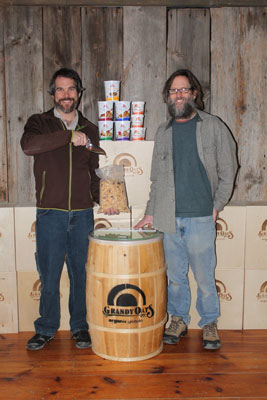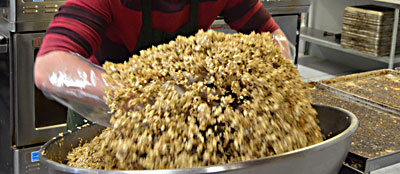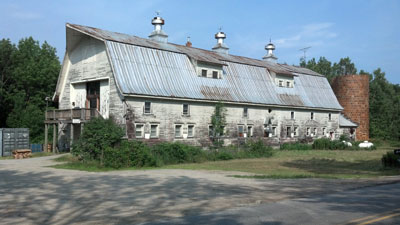 |
| Aaron Anker (left) and Nat Pierce have brought GrandyOats to award-winning fame. |
By Joyce White
Photos courtesy of GrandyOats
GrandyOats has managed something noteworthy in Maine – creating a successful organic food business worthy of the 2013 Producer of the Year Award by the Maine Grocers Association and Food Producers Alliance while maintaining its organic and sustainability values. Nat Pierce and Aaron Anker, both 42 with families, are happy with their partnership in the unique business of creating more than 40 scrumptious, 100 percent organic granolas and trail mixes sold around the country.
Presently located in a historic barn in Brownfield, Maine, close to the New Hampshire border and the White Mountains, GrandyOats had its origin in Farmington. In 1979 two young women, Sarah Carpenter and Penny Hood, began integrating their beliefs in healthy food and joyful living into a small business making healthy granola. One of their founding principles was that life is to be enjoyed, and they wanted like-minded people to carry on their legacy.
In the mid-1990s when they were ready to move on, they turned down offers from people they believed would not be likely to continue along the path they had established. It was not just a business but a lifestyle they were selling, and in Nat Peirce they saw a kindred spirit.
Peirce, born and raised in Scarborough, had been managing the Bountiful Berry café in Bridgton. He bought the GrandyOats business and moved it to Bridgton. The timing was right, he says, as more people in the ‘90s became vegetarians. “It kind of evolved into a broader understanding of better quality food in general.”
At first, Peirce says, “I was doing everything myself.” That involved buying ingredients, mixing, baking, packaging and marketing as well as attending to all the details of running a business. So he contacted a college friend, Aaron Anker, who had some familiarity with Maine from a 1993 summer internship in Boothbay Harbor.
Anker explains that he moved to Maine permanently in 1998, because “I wanted to live in a place I felt I could start my own business and feel a part of a community.” He had grown up in a family that raised and prepared healthy food, and his parents and grandparents modeled a work life balanced with fun.
Anker got experience in the health food industry while managing a vegetarian/vegan bistro in Colorado. In Maine he became immersed in the Fresh Samantha company and says he developed more awareness of the philosophy, production and marketing of organic food. The segment of the population that buys organic food Anker estimates at about 10 percent but growing. He believes that in Maine, more people care where their food comes from.
 |
| All GrandyOats granola is mixed by hand. |
“You can sell it,” Peirce remembers telling Anker when he approached him about a partnership, “and we’ll hire other people we enjoy being with.”
“We knew we’d have to sell outside the state,” Peirce explains.
Anker brought his sales experience to GrandyOats in spring 2000, and MOFGA Certification Services has certified all its products as organic since 2004.
In 2001 they moved GrandyOats to the present location in the Brownfield dairy barn. Peirce and his family first lived in the upper story – the barn had already been converted by former owners for use by humans – and that residential space is now used for offices. Peirce works every day on the premises overseeing production, while Anker is often on the road promoting their products.
In the old barn, which looks like a barn only from the outside, the GrandyOats staff of 18, often referred to as “the GrandyOats family,” creates 11 flavors of organic granola, six trail mixes, seven kinds of roasted nuts and an instant oatmeal cup, ready-to-eat after adding hot water.
Anker relates the story of a new addition to their product line: “A couple years ago, the food service manager at Bates College, Cheryl, asked if we could make a multigrain hot cereal. They were buying a product from California and wanted a more local product. So I said sure. We sourced some organic ancient grains – spelt, quinoa, kamut and rye – and I called our friends at Fiddlers Green in Belfast, Maine, and got some cereal grains they use in a few of their products. My first testers are my daughters, Sienna and Rubina. Sienna, 8, began to mix cream of wheat and cream of rice with rolled spelt, rye, kamut, quinoa and oats. ‘Dad, I like them together!’ Sienna said after mixing both cream of wheat and cream of rice. So we blended the grains together and created a quick-cooking, ancient grains hot cereal that tastes good and is creamy and hearty. Bates loved it and now serves it a couple days a week. It is now sold on more than 10 college campuses in the Northeast.” Chefs to whom he has related that story, Anker says, love that type of authenticity.
 |
| GrandyOats is currently located in a former dairy barn in Brownfield but is moving to a former elementary school building in Hiram. |
Up a short flight of outside stairs leading to the second floor of that cavernous building that housed dairy cattle in its early days, horses at one point, even chickens for a time, is a large, comfortable space dedicated to a conference area, kitchen and bathroom area, computer space and an area with sofas where the talking and thinking take place.
But it’s down below, on the ground floor of the barn, where all the action takes place – the intake and storage of ingredients, the mixing, baking and packaging of the product, the preparation for shipment to buyers.
Anyone who enters this production area must don a hairnet. All the granola is still mixed by hand – “same old process, just more batches now,” Anker says as he guides me on a tour of this area. He introduced every staff person by name and with friendly comments. The names didn’t stick but what did stick in my memory is the way the whole process works in such an orderly, pleasant way.
A sturdy man with a hairnet and elbow-length plastic gloves is deep into a batch of granola, mixing all the ingredients in the huge vat with a motion similar to kneading bread. Beside the mixing station is the tall oven with spaces to accommodate several large trays. The packaging area is next to the vacuum sealer. Everything is vacuum sealed, Anker explains, to maintain freshness during storing and shipping.
GrandyOats uses recyclables when possible; the big cans and bottles of old have been replaced with plastic inserts in large, rigid frames for dispensing maple syrup, honey and oil. Throughout the whole production, efforts are made to maintain sustainability.
Up a small flight of steps at the end of the production area, two pleasant young women are applying labels to bags of granola and trail mix that will go to Bates, Colby, UMaine, UNH – 40 colleges in the Northeast.
“College kids eat healthier now,” Anker says. They even have a gluten-free granola, he explains, to meet the evolving requirements of the culture. They also sell to United Natural Foods, which supplies food co-ops around the country as well as several Whole Foods stores.
In 2010 GrandyOats celebrated its 30th anniversary with a new design, new recyclables and new reusable packaging. Nothing about the soul of the company has changed, though. It is still committed to sustainable agriculture, recycling, social responsibility and minimizing its impact on the environment.
GrandyOats uses no genetically engineered products. Its sustainability statement, Anker says, “guides the business. We believe we are responsible to be good community members, in the state of Maine, the Mt. Washington Valley and the organic food industry.”
Another change is coming to GrandyOats soon. The company needs more space and will be moving to an ideal location in Hiram, about 15 minutes away, to a former elementary school building on the Saco River. Rural Maine has always been – and will remain – a part of GrandyOats. The company is committed to employing local people and expects to hire five new employees once settled in the new location. Organic farming, GrandyOats believes, can be an important way to preserve rural communities. Repurposing the Hiram school is also part of its mission. Anker says, “We like the idea of taking an old building and finding a new use, breathing fresh air into it.”
With the move, GrandyOats has decided to update its packaging and its whole brand look. Anker says, “We realized we are as authentic as it gets in the granola market. Many other brands on the shelves are made by large manufactures or owned by the large Midwestern cereal manufacturers. We make everything by hand in small batches in rural Maine. So our new brand will speak to our ‘70s roots, our organic philosophy and authenticity.” They’ll unveil the brand at the fall 2014 Common Ground Country Fair.
GrandyOats chose to partner with like-minded organic businesses designed to help each other flourish and better achieve the shared mission to increase organic farms and food consumption. The company buys its organic ingredients from worker-owned farms when possible and tries to source ingredients and services as locally as possible to keep relationships with its community thriving. It has no outside investors other than loans from local banks.
Anker says, “I can’t imagine doing all this alone. The partnership aspect is very important, and MOFGA has helped with advice. We continue to learn from MOFGA’s annual inspections.”
The original GrandyOats owners come by occasionally and are pleased with the way the business they started and sold is going.
Anker comments, “We’re grateful for 35 years of its existence. We try to live a healthy lifestyle in the business and in our families.”
About the author: Joyce is a long-time writer for The MOF&G. She gardens in Stoneham, Maine.
